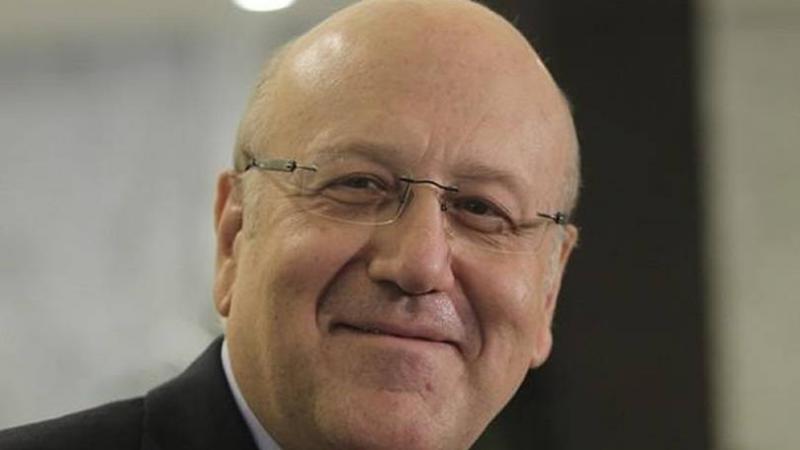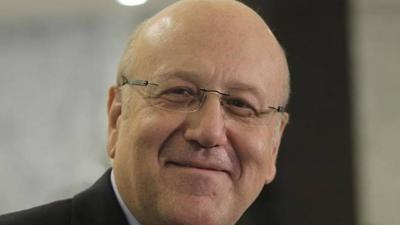Two days ago, caretaker Prime Minister Najib Mikati met with the German Ambassador to Lebanon, Andreas Kindl, at the Grand Serail. This news would have been seen in its normal context had it not been for the disagreement that arose between Mikati and Foreign Minister Abdullah Bouhabib regarding reports submitted that contradicted reality and targeted religious and political figures, which prompted Bouhabib to raise concerns before his departure to the United States.
The visit sparked displeasure within the Foreign Ministry, whose sources regarded Mikati's reception of the ambassador, who overstepped his diplomatic role in dealing without reverting to the relevant ministry, as a violation of the ministry’s role and its dealings with ambassadors. Particularly, Mikati praised the ambassador's work and lauded his country’s contribution to supporting the Syrian refugees, while he himself advocates their continued stay in Lebanon and opposes their return to their homeland. What transpired signals a widening governmental rift and increasing distance between the PM and the ministers, especially since this is not the first time Mikati has bypassed the Foreign Ministry instead of coordinating with it to preserve Lebanon’s interests.
In its comment on Mikati's stance, sources from the Foreign Ministry said, "The caretaker Prime Minister has no right to receive the ambassador and praise him without having the Foreign Minister understand the reality of what transpired." The conflict with Ambassador Kindl, which has been ongoing for some time, stems from his positions on Syrian refugees and his repeated criticisms of Lebanese officials. He approached the Foreign Ministry complaining about General Security Director General Abbas Ibrahim for not allowing refugees visiting his embassy in Lebanon to cross the Lebanese border, which contradicts the Vienna Convention. The minister responded, "Which convention permits a citizen to travel to a foreign country for a visa? I don't know what you are talking about and I must consult with the concerned party to understand the reality of the issue." Upon investigation, it became clear that Syrians heading through the Lebanese border to visit the German embassy in Lebanon are allowed entry contrary to what the ambassador claimed, but the increasing numbers were surprising, rising from about 180 refugees to over 250 daily under the pretext of visiting the embassy, and they were still permitted to cross.
Afterward, the minister clarified the matter to the ambassador, telling him, "What General Ibrahim is doing is systematic, while what you are doing on Lebanese soil—inciting and disseminating false information to international organizations—is contrary to the Vienna Convention," urging him to respect the limits of his diplomatic role. This was especially pertinent as the ambassador visited investigative judge Tarek Bitar, justifying his visit to the Foreign Minister as concerning inquiries about a German citizen who died due to the port explosion, and he began to speak mockingly about Lebanese religious, security, and political figures in front of journalists.
This too drew condemnation from the Foreign Ministry, which informed him that his country is a friendly state, appreciated for its cooperation and assistance to Lebanon, but "I urge you to respect your professional limits in not targeting individuals in your political discourse, considering the country is open and the risks are many." The ambassador interpreted this as a threat and sent reports to his country and international organizations in this regard, although sources from the Foreign Ministry say that the meeting ended positively, with an agreement for the minister to meet after the holidays.
While the Foreign Ministry considered that it had delivered its message appropriately, the situation stirred discussions within its ranks following Mikati's reception of the German ambassador and issuing a statement praising his work without consulting the Foreign Minister about the events that transpired. Sources expressed surprise that this is not the first time Mikati has taken such action. Previously, the head of the UN Refugee Agency accused Lebanese officials of being responsible for stirring sensitivities between Lebanese and Syrian refugees, and while the Foreign Ministry objected to his remarks, the Prime Minister welcomed him, and when Bouhabib inquired, he simply responded, "I did not issue a public statement about his visit."
The Foreign Ministry sources expressed astonishment at the Prime Minister's action and the statement praising the ambassador, particularly since he is the entrusted leader of Lebanon's sovereignty, especially in the absence of a president. They questioned, "Is it possible to overlook the ambassador's oversteps without blame or to discuss with the relevant ministry what transpired between them? Is the intent to bypass the minister and absolve his position in front of the ambassador?" They expressed disbelief that the Prime Minister is addressing an issue without referring directly to the concerned authority; he could have consulted him even via a WhatsApp message to preserve the Foreign Ministry's position before accredited ambassadors rather than acting independently and praising an ambassador who exceeds his mandate.
The Foreign Minister, currently abroad, refused to comment on Mikati's reception of the German ambassador, waiting until his return to Lebanon to declare his stance on what happened. Two days prior, the German ambassador and several ambassadors visited General Ibrahim, who clarified the procedures followed for Syrian refugees visiting embassies in Lebanon, emphasizing the necessity of prior notification 48 hours in advance, a practice that was in place before COVID-19 and has since resumed to ensure visitors' identities and objectives, protecting embassy security.
Monitoring sources indicated that the ambassador criticized the handling of the matter but was told that Lebanon values its relationship with Germany and that nothing is directed against him, with errors addressed through diplomatic means. Other sources criticized how the ambassador operates in Lebanon and engages with the refugee issue as if there is no state in Lebanon, showing clear bias against matters that conflict with Lebanon's policies and dealings.




